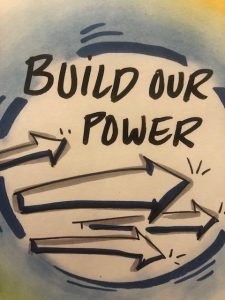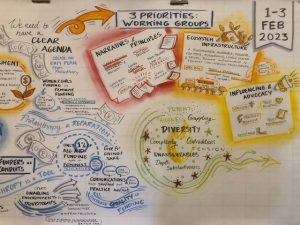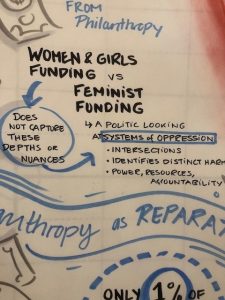At a remarkable gathering in Lake Naivasha, Kenya, 100 African feminists, women’s funds and philanthropists gathered last month for an Indaba.
Two hours’ drive from the capital Nairobi, the Indaba – a Zulu term for an important conference – could prove a defining moment for philanthropy. Charles Keidan reports.
Who gets to decide the philanthropy agenda – the dominant set of ideas, narratives and resources which shape not just philanthropy but the conversation about philanthropy? What place do pan-African and feminist movements have within that? And what place should they have?
 To the African philanthropy practitioners – and several international funders – which were brought together by Urgent Action Fund – Africa (UAF-Africa) and Trust Africa for three days of intense debate, the answer was clear. It’s beyond time to build the power of pan-African and feminist philanthropies and challenge dominant ideas in philanthropy circles – rooted in capital acquisition and appropriation, patriarchy and white power.
To the African philanthropy practitioners – and several international funders – which were brought together by Urgent Action Fund – Africa (UAF-Africa) and Trust Africa for three days of intense debate, the answer was clear. It’s beyond time to build the power of pan-African and feminist philanthropies and challenge dominant ideas in philanthropy circles – rooted in capital acquisition and appropriation, patriarchy and white power.
The central question of the gathering was not whether but how to do this.
The conference began with a declaration of intent. ‘We’re aiming for powerful game-changing interventions and an ambitious programme’, Ebrima Sall, Executive Director of Trust Africa, told me before the meeting in an early indication that this movement meant business. ‘As philanthropy comes of age, we need institutions led by Africans and centring African agency in the issues facing the continent’. ‘This is deeply political work’ noted Njoki Njehu, the Board chair of UAF-Africa in the opening session.
What would this look like in practice, I wondered?
 While Western debates are currently focused, some might say stuck, around distinctions between sex and gender, the conversation in Naivasha was abuzz with visions of pan African feminist philanthropy – visions given beautiful expression by artist Sonja Niederhumer of Graphical Harvest. The vision comprised multiple elements according to Ndana Bofu-Tawamba of UAF-Africa – a critique of male domination but – when fused with ideas of pan-Africanism – also something more than that. ‘We appreciate the support and generosity of friends of Africa… but it’s time for a shift in the way philanthropy is working building on a 50-year history’ she observed recounting the work of pioneering women’s movements such as AWDF, Astrea and Mama Cash.
While Western debates are currently focused, some might say stuck, around distinctions between sex and gender, the conversation in Naivasha was abuzz with visions of pan African feminist philanthropy – visions given beautiful expression by artist Sonja Niederhumer of Graphical Harvest. The vision comprised multiple elements according to Ndana Bofu-Tawamba of UAF-Africa – a critique of male domination but – when fused with ideas of pan-Africanism – also something more than that. ‘We appreciate the support and generosity of friends of Africa… but it’s time for a shift in the way philanthropy is working building on a 50-year history’ she observed recounting the work of pioneering women’s movements such as AWDF, Astrea and Mama Cash.
This gathering did not exist in a vacuum. In fact, it had both short- and longer-term antecedents. Urgent Action Fund had already co-ordinated a 300-person ‘feminist republic’ and joined with Trust Africa to run a smaller meeting in July which produced a set of principles and declarations around pan-African and feminist philanthropy.
Pan Africanism is a political idea as well as a geographical one – ‘a politik’ – explained American Algerian facilitator and former Global Fund for Women vice-president, Leila Hessini. By fusing race and gender, the term opens a common space for people of African descent and their allies to develop a different vision of the future, one which can bring, say, an Afro-Brazilian woman into common cause with a Kenyan woman.
This radical spirit is already capturing attention of US donors judging by their recent endorsement of a new fund to support black feminists run by the Black Feminist Fund – also in attendance.
 Taking a more political stance also saw a healthy challenge to the tendency of liberal funders to seek to depoliticise their work. The adoption of a posture of apparent neutrality will not do, a number of attendees argued. The classic donor and grant manager categorisation of funding for ‘women and girls’ came in for particular criticism with many arguing that there is a need to amplify explicitly feminist philanthropy rather than dilute it. These calls may be starting to be heard. A recent report co-authored by Bridgespan, a leading philanthropy consultancy, acknowledged their own blindspots stating that a ‘focus on program measurement, scalability and “what works”…may have led us to overlook feminist movements.’
Taking a more political stance also saw a healthy challenge to the tendency of liberal funders to seek to depoliticise their work. The adoption of a posture of apparent neutrality will not do, a number of attendees argued. The classic donor and grant manager categorisation of funding for ‘women and girls’ came in for particular criticism with many arguing that there is a need to amplify explicitly feminist philanthropy rather than dilute it. These calls may be starting to be heard. A recent report co-authored by Bridgespan, a leading philanthropy consultancy, acknowledged their own blindspots stating that a ‘focus on program measurement, scalability and “what works”…may have led us to overlook feminist movements.’
There was also a challenge to the emerging African venture philanthropy community who, in the words of one participant, ‘are not supporting feminist movements to the extent they should’. They should be more feminist! one attendee suggested to widespread agreement. The African Venture Philanthropy Association will hold its first pan African meeting later this year. Its card will be marked. ‘There’s no point in shifting the geographical location of elitism’, pointed out Brian Kagoro of the Open Society Foundations. ‘Just being African does not mean you behave in different ways. Ideology matters,’ noted Trust Africa senior fellow, Halima Mahomed.
But it was mostly progressive western philanthropic organisations – and specifically the language they routinely use – which received the critique of attendees.
 Centre for African Philanthropy’s Bheki Moyo noted the need to ‘over-ride’ western frameworks of philanthropy he learnt in the US and embrace what the Ford Foundation’s Jessica Horn described as a ‘modern pre-history’ of a domestically rooted African philanthropy sector. She highlighted the presence of three generations of leadership of the African Women’s Development Fund. Horn also praised the significant contribution of African feminists to currently fashionable philanthropy practice of participatory grantmaking, trust-based philanthropy, collective care and well-being and solidarity to name a few.
Centre for African Philanthropy’s Bheki Moyo noted the need to ‘over-ride’ western frameworks of philanthropy he learnt in the US and embrace what the Ford Foundation’s Jessica Horn described as a ‘modern pre-history’ of a domestically rooted African philanthropy sector. She highlighted the presence of three generations of leadership of the African Women’s Development Fund. Horn also praised the significant contribution of African feminists to currently fashionable philanthropy practice of participatory grantmaking, trust-based philanthropy, collective care and well-being and solidarity to name a few.
There were also challenges to what participants saw as unhelpful assumptions embedded in ostensibly progressive language of western philanthropy. Several speakers branded the terminology of ‘decolonising philanthropy’ as ‘problematic’ for re-enforcing an idea that the locus of control and power is in the north. That is ‘undermining of the richness and breadth of African philanthropy’ according to veteran practitioner Theo Sowa.
The movement to #ShiftThePower also received friendly critique along similar lines – an implicit suggestion that power needs to move from north to south. Localisation – another Western-centric term – was questioned for clumsily trying to shift agency but ending up maintaining it in western hands.
There was also frustration at western institutions casting African philanthropy bodies as ‘intermediaries’ – a ‘cheaper option’ for pass-through funding observed OSFs Sarah Mukasa.
So where does that leave Africans working for major international foundations like OSF, Ford, Hewlett Foundation – who together with human rights funder Wellspring – were all in attendance.
‘My access to resources means I’m a bridge to transformation… to serve the cause of transformation’, according to the Ford’s Jessica Horn.
That bridge now extends all the way to the gilded streets of Silicon Valley following the Hewlett Foundation’s recruitment of rising star Diakhoumba Gassama, the first African hired by the foundation outside of the US. A former special adviser to UNAIDS director Winnie Byanima, Gassama is set to play a significant role in changing not just the resourcing but the terms of the conversation around feminist philanthropy well beyond the walls of the Hewlett Foundation.
It was therefore fitting that Gassama facilitated what proved to be a memorable final morning. Between sublime musical interludes from Senegalese musician, Aita Senghor, one participant after another came to the floor to make personal and institutional commitments. Trust Africa and Urgent Action Fund Africa together pledged $500,000 to a new solidarity endowment to build the power of feminist pan African philanthropy.
Equally impressive were the sheer number of participants who came forward to offer their own contributions of time, expertise and money. Perhaps most inspirational was UAF-Africa staffer Edmond Mugisha from Bujumbura, Burundi who the previous day had requested that $50 per month be deducted from his salary in support of the endowment – a pledge which helped inspire a flow of matching commitments from so many others the following day.
Expertise was on offer too. Bheki Moyo pledged to add a feminist philanthropy masterclass to the suite of teaching at Wits University. He also offered to seek advice on endowment management from his university while Marwa El Daly promised to report back on ways in which Egyptian traditions of a Waqf may be harnessed. Meanwhile, the African Women’s Development Fund pledged to commit its team to documenting the story of African feminist and social movements while OSFs Sarah Mukasa pledged to advocate in non-feminist institutions. Ese Emeri of the Global Fund for Community Foundations (and an Alliance regional representative) pledged to ensure that African feminists were present at the next meeting of the #ShiftThePower movement taking place in December.
Another person whose presence was felt was the philanthropist MacKenzie Scott. Despite its imperfections, many participants could be heard between sessions praising her philanthropic backing of women’s funds from Latin America to Africa. I wondered what she would make of these conversations – and the ripening of change – happening here thanks in part to her allyship.
And what of those African colleagues in the room representing western foundations? It was clear that they were all deeply impressed but perhaps predictably, they would have to submit their reports and ‘revert to HQ’, as Ford’s Nicky LeRoux put it. Institutional funding may follow.
The finale of this conference – and the conference itself – was one of the most interesting in my 20 years in philanthropy. Sometimes you glimpse the passion of activists only to see it frustrated. And on other occasions, you see effective practitioners but without a deeper vision to drive forward the work. Here we had both vision and action. A shared vision for pan-African and feminist philanthropy, a plan to build its power through an emerging infrastructure and hopes for an African rooted and run endowment.
It will be fascinating to see how the dedicated practitioners gathered in Naivasha will transform philanthropy in the years ahead. The transformation will make pan-African and feminist philanthropy more present, powerful and visible. How it will influence local and western billionaires and, of course, the venture philanthropy crowd remains to be seen.
Strategic and tactical tensions and questions will also need to be navigated. But be in no doubt, African feminists – and feminists everywhere – will be playing a central role in the years to come if this special gathering on the shores of Lake Naivasha is anything to go by.
Charles Keidan is Executive Editor of Alliance magazine.






Comments (0)